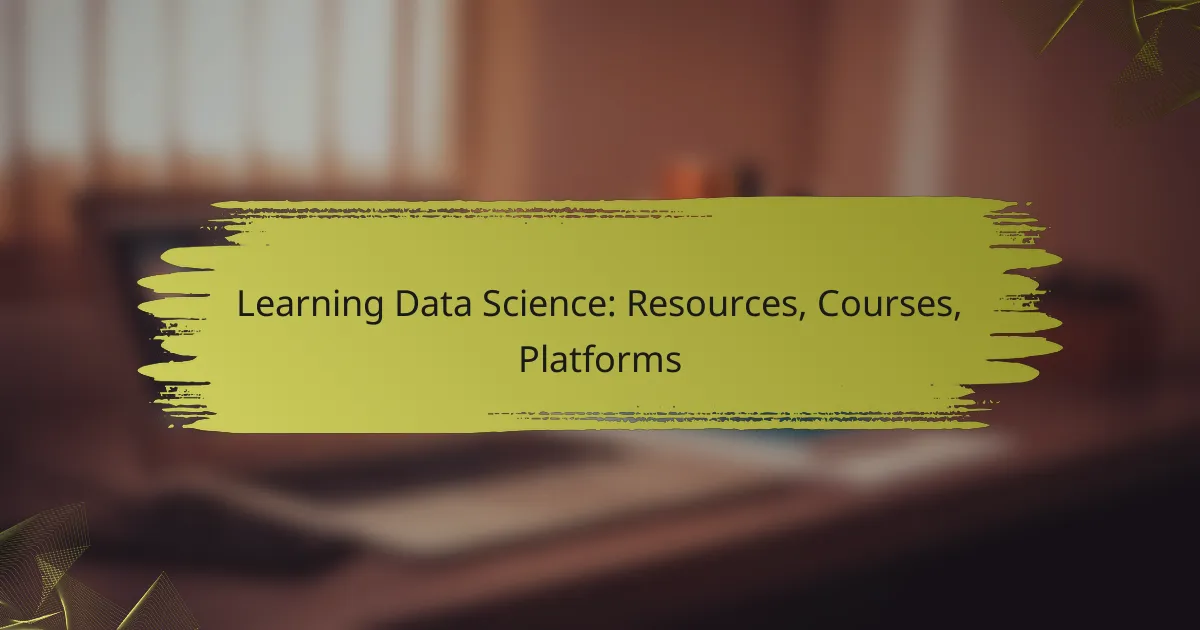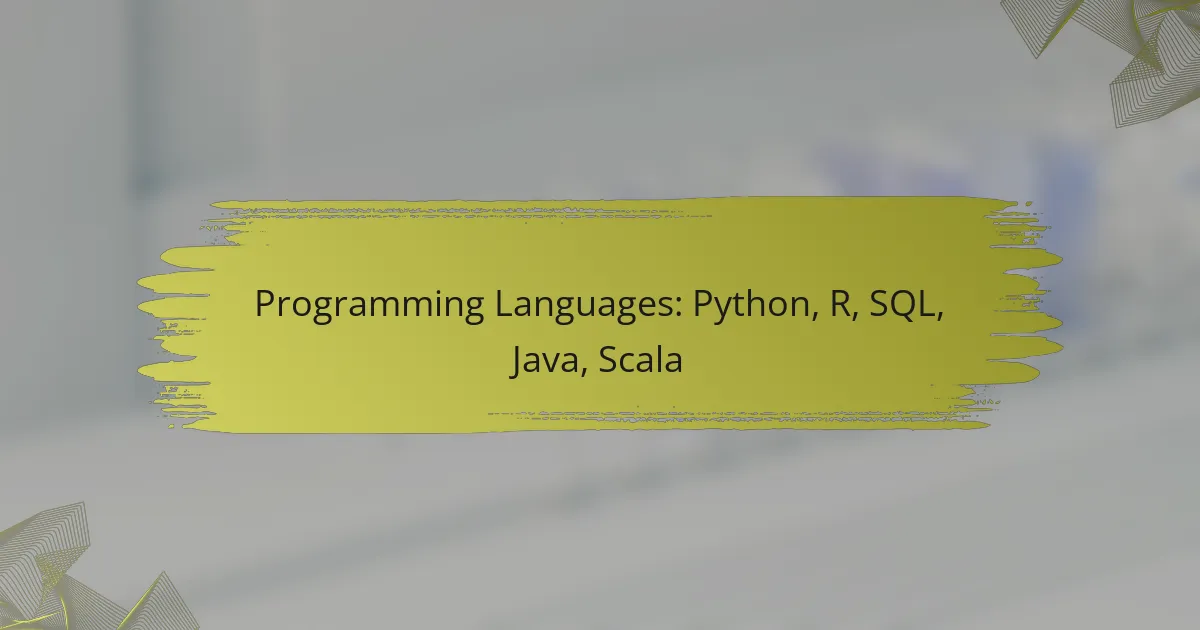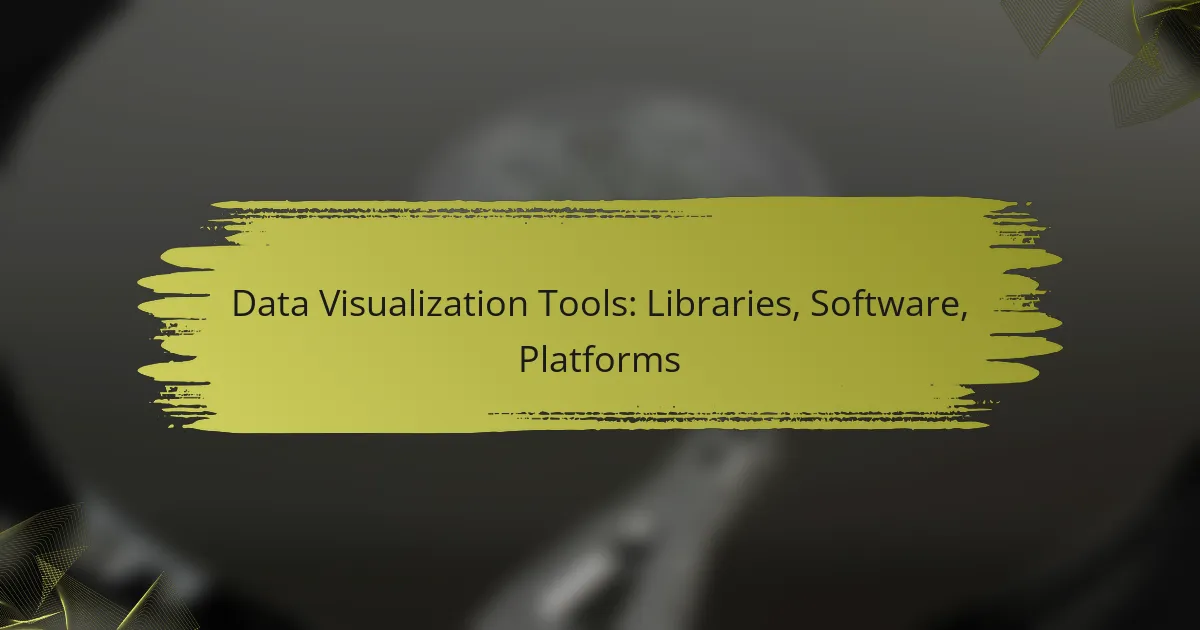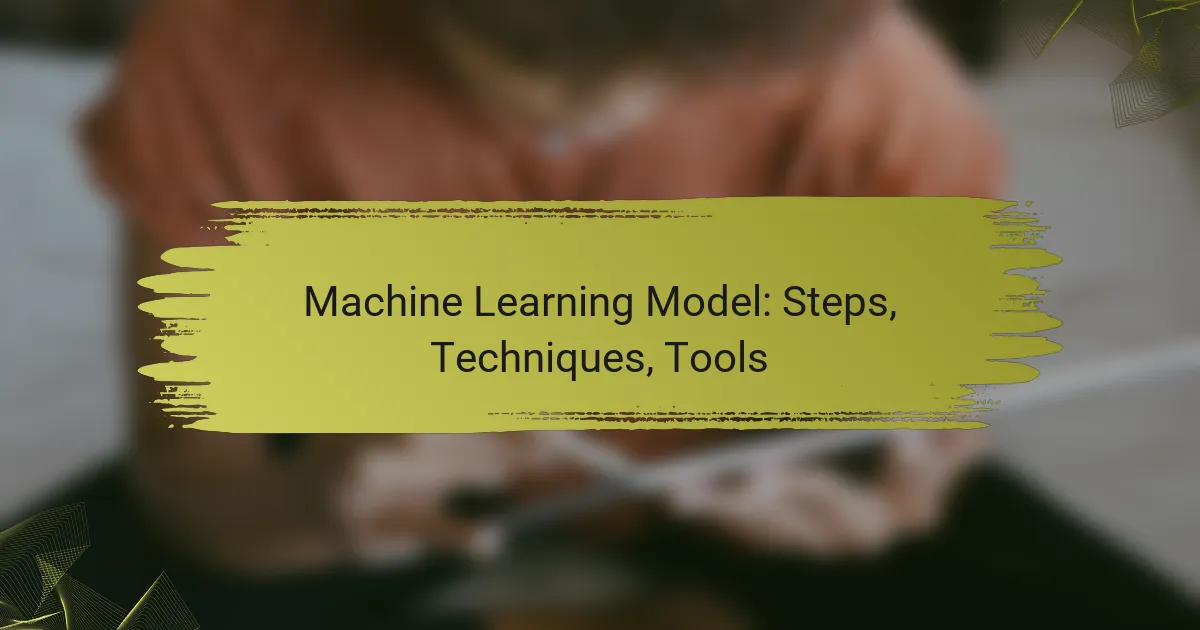Learning Data Science has never been more accessible, thanks to a variety of online platforms that offer diverse courses and hands-on projects. These resources cater to different learning styles and budgets, allowing individuals to enhance their skills effectively. By selecting the right course that aligns with your current abilities and goals, you can embark on a structured learning journey that includes practical experience with real-world datasets.
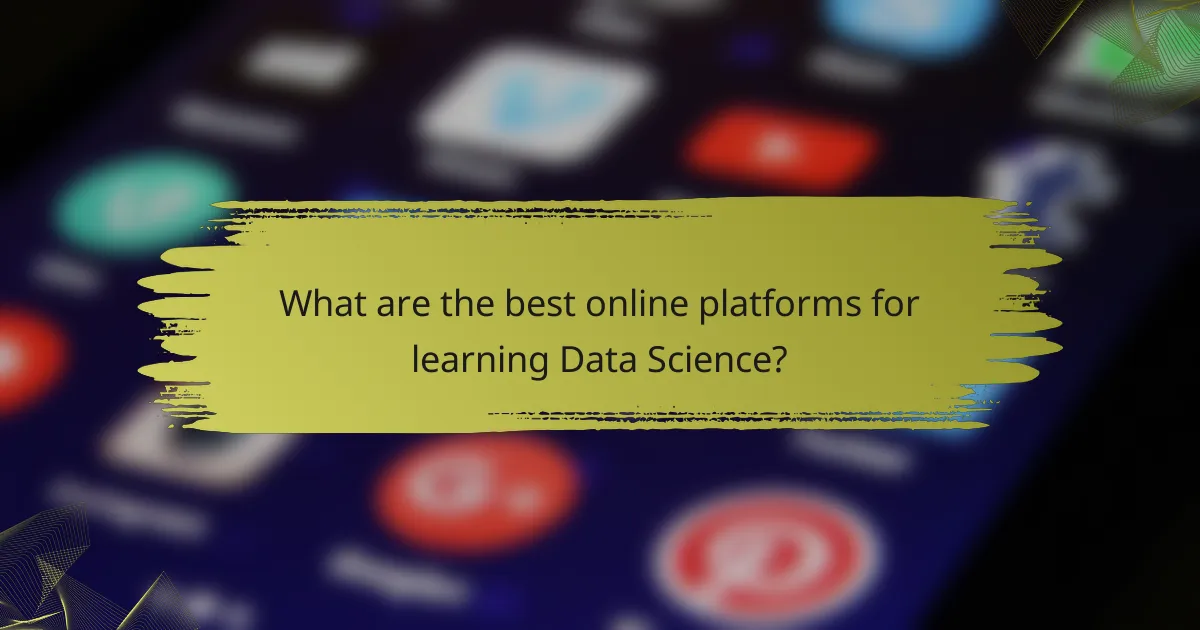
What are the best online platforms for learning Data Science?
The best online platforms for learning Data Science offer a variety of courses, hands-on projects, and community support. These platforms cater to different learning styles and budgets, making it easier for individuals to find suitable resources to enhance their skills.
Coursera
Coursera partners with top universities and organizations to provide a wide range of Data Science courses. Users can enroll in individual courses or complete specializations that consist of multiple related courses, often culminating in a capstone project.
Many courses are free to audit, but obtaining a certificate typically requires a fee, usually ranging from $39 to $79 per course. Financial aid is available for those who qualify, making it accessible for learners on a budget.
edX
edX offers high-quality courses from prestigious institutions like Harvard and MIT. It features MicroMasters programs and professional certificates that allow learners to dive deep into specific Data Science topics.
While many courses can be audited for free, obtaining a verified certificate costs between $50 and $300. edX also provides financial assistance options, ensuring that cost is not a barrier for motivated learners.
Udacity
Udacity focuses on industry-relevant skills through its Nanodegree programs, which are designed in collaboration with leading companies. These programs often include real-world projects and mentorship, providing a practical learning experience.
Prices for Nanodegree programs typically range from $399 to $1,200, depending on the length and complexity of the course. Udacity frequently offers discounts, so it’s worth checking for promotions before enrolling.
DataCamp
DataCamp specializes in Data Science and analytics training through interactive coding challenges and projects. The platform is particularly user-friendly, making it suitable for beginners who want to learn programming languages like Python and R.
DataCamp operates on a subscription model, with plans starting at around $25 per month. This allows learners to access all courses during their subscription period, making it a cost-effective option for those looking to explore various topics.
Kaggle
Kaggle is a platform primarily known for its data science competitions but also offers a wealth of resources for learning. Users can access free courses on Data Science topics, participate in discussions, and practice their skills on real datasets.
While Kaggle does not charge for its educational content, the competitive aspect encourages learners to apply their knowledge and improve their skills in a practical setting. Engaging with the community can also provide valuable insights and networking opportunities.
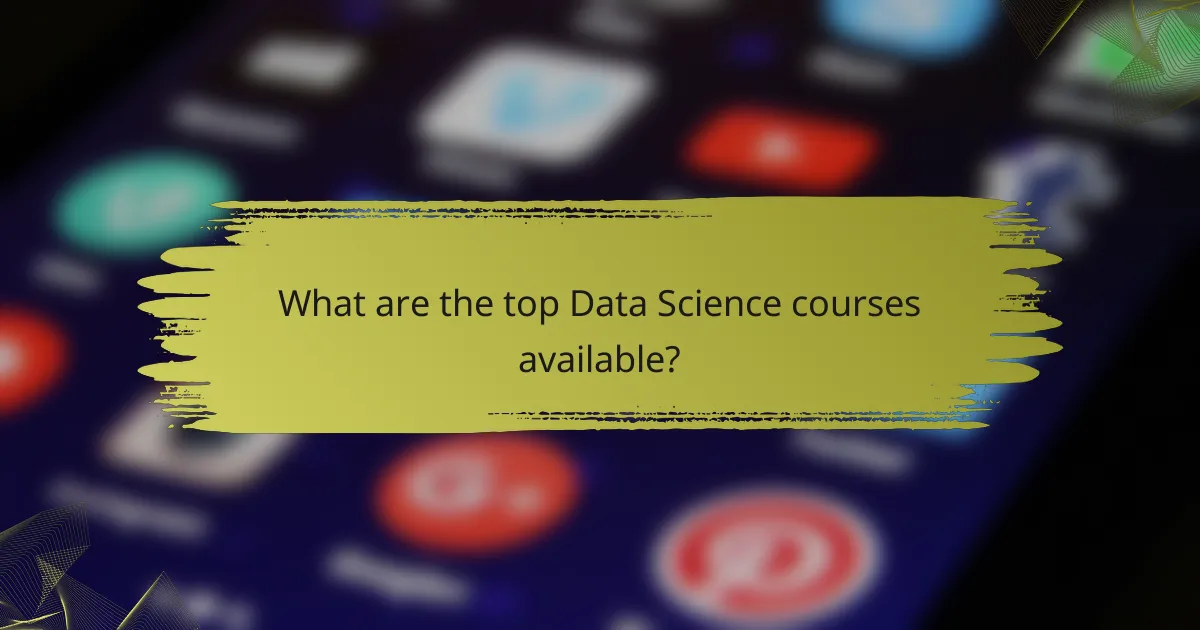
What are the top Data Science courses available?
The top Data Science courses provide structured learning paths, practical projects, and industry-recognized certifications. These programs cater to various skill levels, from beginners to advanced practitioners, and often include hands-on experience with real-world datasets.
IBM Data Science Professional Certificate
The IBM Data Science Professional Certificate is designed for beginners and covers essential topics like data analysis, visualization, and machine learning. It consists of multiple courses that guide learners through practical projects using tools such as Python and SQL.
This program typically takes about three to six months to complete, depending on the learner’s pace. It is offered on platforms like Coursera, making it accessible to a global audience.
Harvard Data Science Professional Certificate
Harvard’s Data Science Professional Certificate is a comprehensive program that emphasizes statistical concepts and data analysis techniques. It includes courses on R programming, data visualization, and machine learning, providing a solid foundation for aspiring data scientists.
Completing this certificate usually requires around four to six months of study. It is available through edX, allowing learners to engage with high-quality academic content from a prestigious institution.
Applied Data Science with Python Specialization
This specialization, offered by the University of Michigan on Coursera, focuses on practical applications of data science using Python. It covers libraries such as Pandas, Matplotlib, and Scikit-learn, enabling learners to perform data analysis and machine learning tasks effectively.
The program consists of five courses and can be completed in about five months. It is ideal for those looking to enhance their programming skills while applying them to data science projects.
Data Science MicroMasters Program
The Data Science MicroMasters Program from UC San Diego is an advanced series of graduate-level courses that delve into data science theory and practice. It covers topics such as probability, statistics, machine learning, and big data analytics.
This program is designed for individuals who already have a foundational understanding of data science concepts and can take approximately 10 months to complete. It is offered on edX and provides a pathway to earn credit towards a master’s degree at participating universities.

How to choose the right Data Science course?
Choosing the right Data Science course involves assessing your current skills, defining your learning goals, and evaluating course reviews. A well-suited course aligns with your expertise and objectives, ensuring a more effective learning experience.
Assess your current skill level
Begin by identifying your existing knowledge in statistics, programming, and data analysis. If you’re a beginner, look for introductory courses that cover foundational concepts. For those with some experience, consider intermediate or advanced courses that delve deeper into specific topics like machine learning or data visualization.
A simple self-assessment can help: list your skills and rate them on a scale from 1 to 5. This will clarify which areas need improvement and guide your course selection.
Consider your learning goals
Your learning goals should dictate the type of course you choose. Are you looking to switch careers, enhance your current job skills, or pursue a specific project? For career changers, comprehensive programs that offer job placement assistance may be beneficial.
Additionally, think about the format that suits you best. Online courses offer flexibility, while in-person classes may provide more direct interaction. Align your goals with the course structure to maximize your learning outcomes.
Evaluate course reviews and ratings
Researching course reviews and ratings can provide insights into the quality and effectiveness of a program. Look for feedback on course content, instructor expertise, and overall student satisfaction. Websites like Course Report or Class Central can be useful resources for finding aggregated reviews.
Pay attention to the number of reviews and the overall rating; a course with hundreds of positive reviews is often a safer choice than one with few ratings. Consider reaching out to alumni for firsthand experiences to further inform your decision.
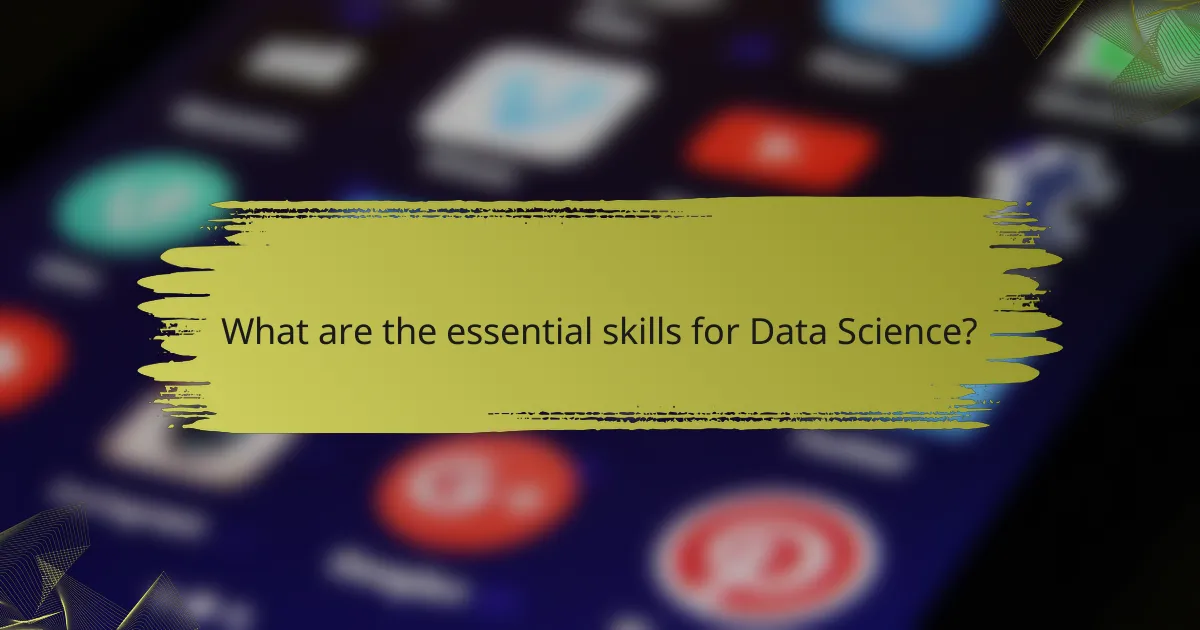
What are the essential skills for Data Science?
Essential skills for data science include statistical analysis, programming proficiency, data visualization, and a solid understanding of machine learning. Mastering these areas enables data scientists to extract insights from data effectively and make data-driven decisions.
Statistical analysis
Statistical analysis is crucial for interpreting data and drawing valid conclusions. It involves understanding concepts such as probability, distributions, hypothesis testing, and regression analysis. Familiarity with statistical software and tools can significantly enhance your ability to analyze datasets.
Common techniques include descriptive statistics for summarizing data and inferential statistics for making predictions. A strong foundation in statistics allows data scientists to validate their findings and ensure their results are statistically significant.
Programming in Python and R
Proficiency in programming languages like Python and R is essential for data manipulation, analysis, and modeling. Python is widely used for its readability and extensive libraries, such as Pandas and NumPy, which facilitate data handling. R, on the other hand, excels in statistical analysis and visualization.
Both languages have strong community support and numerous resources available for learning. Developing coding skills will enable you to automate tasks, process large datasets, and implement complex algorithms efficiently.
Data visualization techniques
Data visualization techniques help in presenting data insights clearly and effectively. Tools like Matplotlib, Seaborn, and Tableau allow data scientists to create visual representations of data, making it easier to identify trends and patterns. Good visualizations can communicate findings to stakeholders who may not be familiar with data analysis.
When creating visualizations, focus on clarity and simplicity. Use appropriate charts and graphs to represent data accurately, and ensure that your visuals tell a coherent story. Avoid clutter and unnecessary complexity to enhance understanding.
Machine learning fundamentals
Understanding machine learning fundamentals is vital for developing predictive models and algorithms. Key concepts include supervised and unsupervised learning, model evaluation, and feature selection. Familiarity with algorithms such as decision trees, neural networks, and clustering methods is also important.
Start with simple models and gradually explore more complex techniques. Utilize libraries like Scikit-learn for Python to implement machine learning algorithms easily. Continuous practice and experimentation will help solidify your understanding and improve your skills in this area.
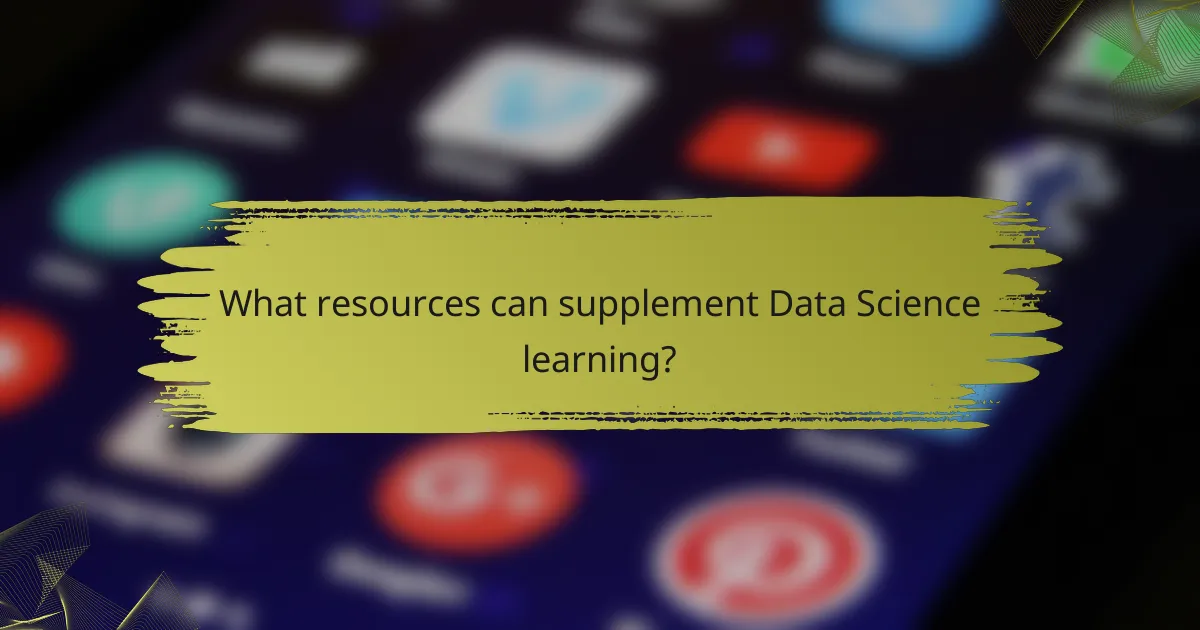
What resources can supplement Data Science learning?
Supplementing Data Science learning with various resources can enhance understanding and practical skills. Key resources include specialized books, online forums, and educational YouTube channels that provide diverse perspectives and insights.
Books like “Hands-On Machine Learning” by Aurélien Géron
Books such as “Hands-On Machine Learning” offer practical guidance on implementing machine learning techniques using popular libraries like TensorFlow and Scikit-Learn. They typically include real-world examples and exercises that reinforce concepts.
When selecting books, consider your current skill level and the specific topics you want to explore, such as deep learning or data visualization. Look for titles that include hands-on projects to apply what you learn.
Online forums such as Stack Overflow
Online forums like Stack Overflow are invaluable for troubleshooting and gaining insights from experienced practitioners. You can ask questions, share knowledge, and learn from discussions on a wide range of Data Science topics.
Engaging in these communities can help you stay updated on industry trends and best practices. Be sure to search for existing answers before posting new questions to maximize your learning experience.
YouTube channels focused on Data Science
YouTube channels dedicated to Data Science provide visual and engaging content that can simplify complex concepts. Channels like StatQuest and Corey Schafer offer tutorials, project walkthroughs, and explanations of algorithms in an accessible format.
When choosing channels, look for those that align with your learning style and cover the specific areas of Data Science you are interested in. Regularly watching these videos can reinforce your knowledge and introduce you to new tools and techniques.
